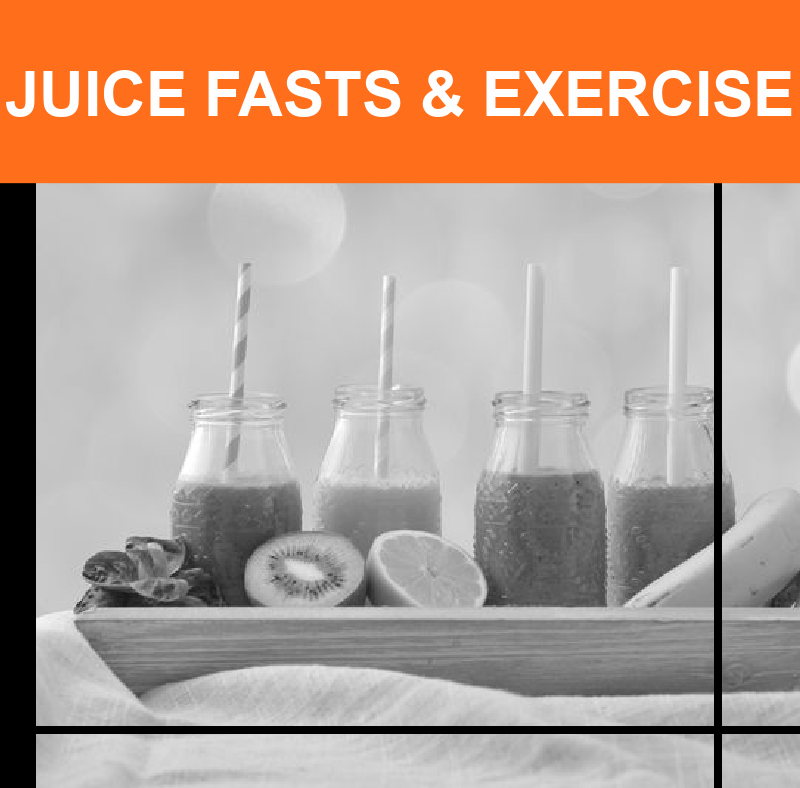
After returning from a farmer’s market with an armload of nature’s bounty, placing it all in a blender and creating a week’s worth of liquid meals may be an alluring prospect to some. Prior to embarking upon an uncharted juicing expedition, you may wish to consider just how the body reacts to a week without any protein or fat… and the stringent caloric restriction that juice fasts invoke.
Potential Pitfalls
We frequently remind clients, especially our heavy lifters, of the need to refuel the body following strenuous workouts. The meal typically suggested post-workout includes simple carbohydrates and lean protein, ranging from a 2:1 to 3:1 ratio. If a client indicates a preference for liquid supplementation rather than an actual whole-food meal, protein shakes come in hand–provided they contain the requisite amount of protein. As we all have read from a variety of sources, and no doubt have experienced ourselves, whey protein coupled with simple carbs gets absorbed very rapidly, going right to work feeding muscle tissue and replenishing glycogen stores.
When an individual chooses to juice exclusively, the stark absence of significant protein may render his/her tough workout fairly useless. Muscle mass cannot be won, no matter how powerful the effort expended, without the proper building blocks. Certainly the abundance of fresh fruits in a juice shake provides an ample source of simple carbohydrates and readily-available glucose; however, a post-workout body that requires protein simply cannot make do on fruits alone.
A Weak Week
Life sometimes throws us all curve balls that affect our usual schedules, causing us to miss an occasional pre-workout or post-workout feeding. For one day, we can make adjustments, either by eating a whole-food meal an hour later than planned or increasing the protein content of the next meal.
Now, consider an entire week’s worth of lifting and cardio in the absence of protein, complex carbohydrates, and healthy fats. We can easily envision how even the leanest, most muscular of physiques will take a significant hit without proper nutrition.
Most strict juicers choose not to augment the purity of their liquid meals with the addition of protein powders or healthy fats. When denied complex carbs and fats, the body’s first and second choices for energy, the lean tissue we do have gets utilized quickly to keep the body going. That does not leave anything upon which to build new muscle tissue.
After two to three days of adhering to a strict juice protocol, the reliance upon muscle tissue for energy begins to exert a negative effect on both the kidneys and intestinal system. Frequent diarrhea can lead to potential dehydration, regardless of the volume of juice ingested.
Building lean muscle mass does not seem remotely achievable under such circumstances, and even in the short term, can handicap the endeavor once the fast ends. At what point does the end result cease to favor the means?
Are Juice Fasts Actually “Cleansing”?
“Juicing junkies” tout the superiority of drinking one’s fruits and vegetables rather than consuming them in their original form, claiming that removing the fiber facilitates absorption. The subject of juicing as a means of cleansing the body, ridding it of unwanted toxins, inevitably comes up around such discussions.
While sports nutritionists and scientists may spend hours debating this tenet, scientific research on this topic has yet to produce significant data. What we do know from professionals, culled from decades of research, reveals how brilliantly our human digestive system has evolved from caveman days, rendering it highly capable of extracting necessary nutrients from a variety of foods, including whole fruits and vegetables. We can thank our aptly-named “detoxifying organs”, from our skin to our digestive system, liver and lungs, for the success of this process. Pure organic juice extracts may add a colorful and healthful boost to a daily diet; however, to do so simply for the benefit of colon cleansing appears to be unnecessary.
Juicing Judiciously
For those who choose to include an occasional juicing meal within the parameters of a healthy diet, keep in mind the quality of the fruits and vegetables entering your blender. When possible, select only organically grown produce. However, extracting even the smallest serving of fresh juice requires a rather large quantity of fruit/vegetables. This can drive up the cost, especially when opting for organics.
To help “flesh out” the nutritional content of juice extractions, place them in the blender along with protein powder or Greek yogurt, and add either flax meal or a tablespoon of nut butter to bolster consumption of healthy fats. If desired, a handful of raw oats tossed in before blending adds bulk and fiber to the mix. Suddenly, your juice extract has turned itself into a delightful and nutrient-dense post-workout fuel source!
If you or a client would still like to give the juice-only fast a go, consider taking the week off from lifting so as to prevent your body from going catabolic and breaking down muscle tissue.
Choose Chewing Over Sipping
While juicing may facilitate the incorporation of vegetables and fruits into everyday meal plans, especially for fussy or picky eaters, consumption of the whole product, either raw or healthfully steamed, confers more overall benefit. The ability to chew at each meal promotes a greater amount of satiety than liquids alone can, another reason to opt for whole food sources for vitamins, minerals, and fiber.
References:
womenshealthmag.com/food/a19934978/juicing/
womenshealthmag.com/weight-loss/a19909188/detox-diet-side-effects/
livestrong.com/article/488965-do-i-eat-while-juicing/
livestrong.com/article/13715764-just-say-no-to-that-detox-diet-or-juice-cleanse/
center4research.org/6-things-need-know-juicing-veggies/






